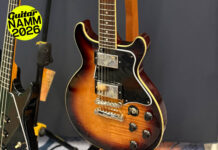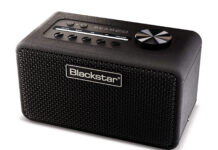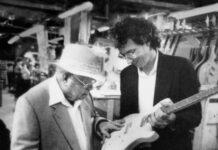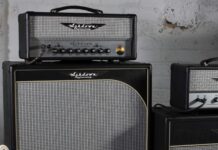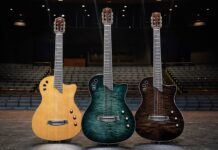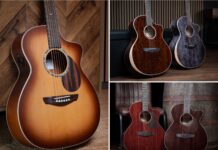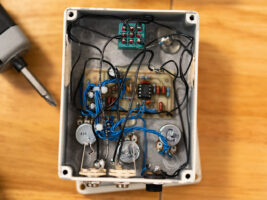
“We have delayed new product launches, or scrapped them entirely”: why boutique pedal makers fear tariffs will destroy the entire US pedal industry
Since President Donald Trump took office for a second time in January 2025, the economic landscape of the USA has changed dramatically. The new tariffs on global imports introduced by the administration in its first few weeks gained huge headlines and publicity at the time. But as media attention has shifted to the other chaotic events that have characterised the administration’s second term, it has been easy to forget that the impact of these tariffs are still being keenly felt by businesses big and small.
In the guitar world, it has led to many of the major guitar brands working together to lobby representatives about issues regarding tariffs on imported tonewoods. But what about the small businesses that underpin a huge portion of the US guitar industry, particularly the boutique pedal world?
Some of the most beloved and famous names in effects have told us that they are now facing a harsh, ever-changing landscape that’s impossible to plan for – and could mean wide-scale layoffs, off-shoring production, drastic price increases or even closure.
One person who has been incredibly vocal about the hardships the tariffs have brought about is EarthQuaker Devices CEO Julie Robbins, who has become an unofficial spokesperson for dozens of makers in the US who are becoming increasingly concerned.
“We have delayed new product launches, or scrapped them entirely,” Robbins tells us. “Our industry is driven by new product launches, so this makes hitting our sales and revenue goals much harder in this climate.”
Through interviews with Robbins and figures from over 30 other boutique pedal, amp and pro audio makers in the USA, we’ve built an unflinching and alarming picture of the current mood in the industry.
Over the coming weeks Guitar.com will explore in detail how tariffs are currently undermining the business models of the entire US boutique pedal industry, but in this introductory article we’re aiming to sound the alarm on what is an existential threat to a vibrant and beloved community.
“We have stopped hiring, including cancelling open positions,” Robins explains. “We will have no choice but to implement a reduction in staff if current conditions continue. This is a devastating thought as our employees are our most valuable asset and losing their income and benefits will put them and their families in a place of hardship.”
For many figures that we spoke to, the story was similar – layoffs, off-shoring and closure were consistently raised as real possibilities.
Levelling the playing field
Since the tariffs were introduced in February, sourcing the basic elements required to make effects – PCBs, resistors, capacitors, potentiometers and transistors – has suddenly become extremely challenging. One of the stated goals of the tariffs is ostensibly to ‘level the playing field’ by bolstering US manufacturing – but there are no domestic manufacturers for many of these vital components. While most of the respondents expressed a willingness to buy American if they could, they’re currently in a compromised position – how do you source resistors and potentiometers from a country that doesn’t make them?
In the rare cases where there are domestic sources for these components, pedal makers face such an extreme increase in costs that their product is no longer viable. Alternatively if a maker instead continues to import, prices spiral upwards unpredictably – tariffs are changing weekly, sometimes daily. How do you run a business when you don’t know whether an order of 5,000 footswitches will cost you $6,000 or $20,000 depending on the week?
We’ve spoken to figures from brands including EarthQuaker Devices, Cusack Music, Keeley Electronics, Walrus Audio, JHS, Hologram Electronics, Death By Audio and Mission Engineering. Every single one of these makers has been negatively impacted by the tariffs in meaningful ways. Some are even contemplating closure.
Despite this, the wider online guitar culture has seemed reluctant to acknowledge the stark reality of the situation. No one wants to think we’re actually seeing an epoch shift that’s destructive enough to threaten the existence of our favourite pedal brands. But as these leaders have told Guitar.com– unless things change, soon, that’s exactly what we are seeing.
So what have makers said about the tariffs?
Every single figure we spoke to describes a significant negative impact from the tariffs. In part this comes from the huge increase in the price of imported parts. But it also comes from how the wildly fluctuating tariffs have made it impossible to plan.
This has already impacted consumers – multiple brands, including JHS and EQD, have delayed new product launches thanks to the tariffs, as they’re just unable to price them appropriately for the spiralling costs. The stress of the instability is keenly felt, too – let’s not forget that even the bigger companies in this space are still relatively small businesses, and some are solo operations. “It’s a significant drain on time and resources that are hard to quantify in terms of dollars,” admits Keeley founder Robert Keeley
Some of the impact can be quantified, however. JHS Pedals’ Steve Offut puts some numbers on it: “A standard stomp switch used to cost around $1.10-$1.50 before tariffs,” he says. “At one point, that price surged to over $3-4 due to the 180% tariffs. Other raw materials and electronic components have generally doubled or tripled in price – including the combined impact of tariffs and cost increases – if sourced from China.”
JHS uses a lot of footswitches a year – roughly 100,000. Tariffs remaining this high would mean an extra expense of $200,000 annually, just for a single component. Now apply that to audio jacks, resistors, capacitors…
Companies have in many cases been thrown into complete limbo by the chaos. EveAnna Manley of Manley Laboratories notes that tariff rates have changed “50 times in the past two months”. As a result, her company has larger-value parts orders on hold, trying to wait out the storm. “We couldn’t afford to pay 180% duties on an order of parts we had already paid $10K for, only to have that rate come down to 55% a week later. What kind of chump would we have been if we had paid out $18,000 to the Trump administration for that order?” she says.
But even if the USA does start its own domestic electronics industry, Steve Offut calls attention to how long that might take. “Companies like JHS Pedals could be at risk of failure if these ongoing tariffs persist long before a domestic electronics manufacturing plant could successfully be established,” he says. And – “even if such a plant were created, it would still likely depend on raw materials imported from China.”
If things don’t change? “By late 2025, we will be impacted heavily,” says JHS founder Josh Scott. “Prices will rise, sales will drop due to that and we may be facing mass layoffs by 2026 in a worst case scenario.”
For other brands, the worst-case scenario is starker still – EarthQuaker’s Robbins has previously raised that these measures threaten the very existence of the company, outside of laying off staff. This was echoed by multiple companies, who said that if things don’t change in the next year, closure is a real possibility.
Routes to survival
Surface-mount soldering robots like the above can speed up PCB production, but investing in machines like these isn’t feasible for many small builders
Almost every brand we spoke to does all of its assembly in the US – a common exception was surface-mount components, as not every pedal maker can afford in-house SMT population. However, outsourcing more of their assembly processes overseas – perhaps all of it – is one route that companies are contemplating in order to survive the post-tariff US.
Walrus Audio’s Colt Westbrook, for instance, admits that “it would be cheaper to offshore manufacturing and pay tariffs on a finished product than it would be to source components, pay tariffs, and then pay for the US manufacturing model.”
However, Westbrook is understandably reluctant to change Walrus’ business model: “we could offshore our manufacturing and scale down to 8-10 employees, but job-making is my God-given passion. These are full-time W-2’d [salaried company employees] folks who have full health, dental, vision, matching 401(k), PTO, and free LaCroix in the fridge.”.
This is the cruel irony of the situation, of course. Brands are being forced to consider moving work overseas by measures that are ostensibly there to bolster the US economy, and ‘level the playing field.’ Many of the people that we spoke to were frustrated by this self-contradiction.
“We are committed to providing solid, stable jobs here in the US for as long as we can,” insists Ryan Shaefer, owner of Hologram Electronics. “But I imagine that if the tariffs persist, many companies will come to the same conclusion – the US is now the least competitive place on planet earth to manufacture something. How could a US company that has to pay tariffs on every single imported part hope to compete with companies outside the US that don’t?”
Offut writes that JHS isn’t making any immediate moves to offshore existing production, as the company has “a solid supply of materials and enough inventory to last us 8 to 12 months”. However he does admit that “overall, there is strong evidence that offshoring could emerge as the more cost effective option which may prove to have unintentional consequences of staff downsizing – the loss of American jobs – which I’m sure no administration is fond of.”
What can be done?
In the grand scheme of things, the impact on small electronics companies might not register highly on most people’s major concerns about the current US administration. But it is clear from what industry figures are saying – if things don’t change, the US pedal industry as we know it will start to collapse.
So if you’re US-based and value the output and indeed the attitudes of any of the companies mentioned, you should add the tariffs and their destructive potential to the things you’re hopefully already contacting your representative about.
Right now, however, lawmakers seem more inclined to ensure that everyone faces these tariffs, regardless of their impact. Ohio Senator Bernie Moreno recently blocked a bill that might have exempted small businesses, for example.
It also bears repeating that this needs to be talked about more. It is unprecedented to see this many major figures in our industry talk this candidly on the record about layoffs and closure. But it speaks to the severity of the situation at hand.
Burying discussion about this is not helpful, nor is denying the real problems people are facing. This is not some hypothetical worst-case scenario – it is happening now, and it is already starting to uproot an industry that all of us as guitarists and musicians care about.
Julie Robbins’ work and testimony in front of a Senate hearing about the impact of the tariffs is to be commended, of course – however there is more to be done. Industry figures spoke to us in huge detail about the challenges they’re facing, and in the coming weeks we will be exploring what they have to say further.
The US pedal industry has been the lifeblood of guitar culture over the last decade, but it’s one that’s being placed under existential threat thanks to Trump’s tariffs.
The post “We have delayed new product launches, or scrapped them entirely”: why boutique pedal makers fear tariffs will destroy the entire US pedal industry appeared first on Guitar.com | All Things Guitar.
Source: www.guitar-bass.net

